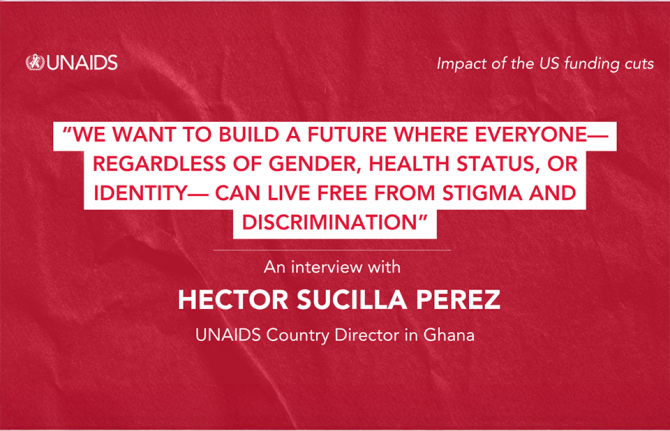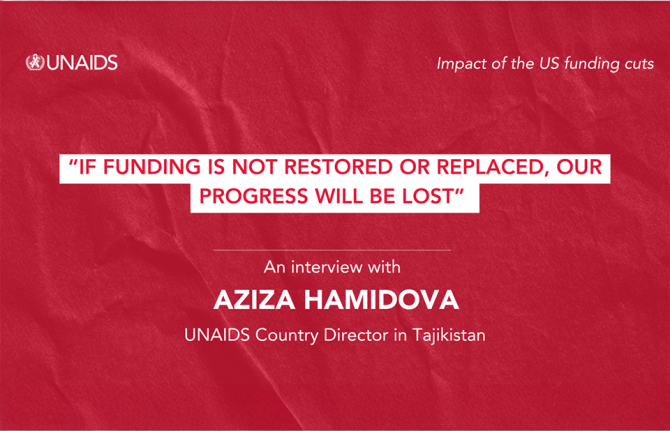

Feature Story
"We want to build a future where everyone—regardless of gender, health status, or identity—can live free from stigma and discrimination"
05 June 2025
05 June 2025 05 June 2025Ghana’s efforts to end AIDS has long relied on international support, particularly from the United States. Recent US funding cuts, however, have led to the suspension of critical programmes including human rights, raising concerns for key populations most affected by HIV-related stigma and discrimination.
In this interview, Hector Sucilla Perez, UNAIDS Country Director for Ghana, talks about the current state of the HIV response, the consequences of these funding changes, and the next steps for the country’s HIV response.
Q: What is the current state of Ghana’s HIV epidemic?
Ghana has an estimated 330 000 people living with HIV, with two-thirds being women aged 15 and over. In 2023 alone, there were 18 000 new infections and 12 000 AIDS-related deaths. The most affected groups are transgender women, men who have sex with men, female sex workers, and women. While new infections and deaths have decreased over the last decade, the reduction is far below expectations—only a 19% drop in new infections and 35% in deaths since 2010. The country needs to speed up more in the way we are decreasing new infections and deaths.
Ghana’s HIV response is heavily dependent on international donors. In 2022, Ghana's total expenditure on HIV and AIDS-related activities was approximately US$ 126 million. The Global Fund covers about 29% of this, PEPFAR (the US President’s Emergency Plan for AIDS Relief) about 8.5%, and the UN about 4.5%. PEPFAR support in Ghana has been essential and critical, investing more than US$ 204 million since 2007, mainly in HIV prevention, testing, treatment support, monitoring, and human rights work.
Q: What specific activities has PEPFAR been supporting in Ghana?
PEPFAR works in three regions of Ghana, (Western, Western North, and Ahafo), supporting essential catalytic services related to HIV prevention, including PrEP, as well as diagnosis, testing, treatment, and support services. They have also been supporting monitoring and evaluation to strengthen health information systems and improve data accuracy, which is critical for guiding our response.
Additionally, PEPFAR has been implementing human rights programmes with special emphasis on eliminating HIV-related stigma and discrimination. While they do not procure antiretroviral treatment in Ghana, they provide key technical assistance to the health sector on supply chain management for drugs and commodities.
Q: What has been the impact of the recent US funding cuts?
The initial pause in US government support affected activities in more than 120 healthcare sites across two regions, affecting 10 civil society organizations collaborating on PEPFAR-implemented programmes.
Some critical PEPFAR-supported actions were thereafter reinstated due to the waiver, particularly those related to the 95-95-95 targets, with a focus on vulnerable populations, especially adolescent girls and young women, and pregnant women. Monitoring, evaluation, data collection, and technical support for supply chain management were also reinstated.
However, strategic activities related to human rights with emphasis on stigma and discrimination, community-led monitoring, and interventions focusing on key populations have been definitively suspended. This represents a significant challenge for Ghana's HIV response.
Q: How is Ghana responding to these funding cuts, particularly regarding human rights programmes?
The government, through the Ghana AIDS Commission, has re-established and reinvigorated the Human Rights Stream Committee supported by UNAIDS and the Global Fund Grant. The Committee is currently to analyzing how the country can take over some of these activities. They are looking at integrating HIV more deeply into actions implemented by other government partners such as the Commission for Human Rights and Administrative Justice (CHRAJ), and increasing collaboration with the Ministry of Gender and Social Protection and the Ministry of Labour. UNAIDS provides technical assistance in support to these efforts.
We are also supporting CHRAJ to develop a handbook on stigma and discrimination through the lens of HIV, health and rights as a sustainable way of embedding continuous professional development in the work of this Government entity on actions focused to address HIV stigma and discrimination.
UNAIDS in Ghana is also strengthening community leadership particularly networks of PLHIV and key populations to play an important role in leading harmonized CLM initiatives in Ghana in collaboration with Global Fund implementers. This is by means of technical assistance and hands on support to communities to develop concrete priorities aligned to key data gaps, including stigma and discrimination and linkages to treatment adherence.
UNAIDS has also engaged with the Global Fund to explore using efficiencies in their grants to cover these activities. The Global Fund has shown willingness to potentially develop a strategy where all stakeholders can contribute to maintaining the most relevant human rights activities in Ghana.
Q: What new initiatives are being developed to address these gaps?
The UNAIDS country office is developing an umbrella strategy called the "Ghana for Rights Initiative." We envision this as a national movement aimed at promoting and protecting human rights in Ghana, especially for those most affected by inequality, discrimination, and stigma.
This initiative goes beyond the regular framework for HIV response, focusing more comprehensively on human rights issues such as gender equality, rights of persons in vulnerable situations, access to healthcare and education, and eradication of HIV-related stigma and discrimination.
The key components are advocacy, capacity building, and community engagement, with a strong emphasis on community-led monitoring. We are accelerating discussions with country partners, including the government, bilateral donors, communities, and the UN agencies to frame human rights in a different approach and mobilize resources for the country to continue priority work on HIV and human rights intersectional agenda.
Q: What are your concerns if human rights programmes remain suspended?
Without these critical human rights programmes, we risk seeing increased stigma and discrimination against people living with HIV and key populations. This could reverse progress made in encouraging people to get tested and access treatment, ultimately leading to more new infections and AIDS-related deaths.
The suspension of community-led monitoring also means we lose vital data and feedback from those most affected by HIV, making our response less effective and less targeted to real needs on the ground. This is why we are urgently working to find alternative approaches and funding sources to maintain these essential services.
Q: What is your message to the international community?
Now is not the time to step back from supporting the global HIV response. The progress we have made over the past years—reducing new infections, expanding access to treatment, and fighting stigma—has only been possible because of strong international solidarity and partnership. The recent US funding cuts have significantly impacted Ghana’s HIV programmes , especially those focused on human rights, stigma, and discrimination, which are essential to reaching the most marginalized and people in vulnerable situations .
We urge donors, development partners, and the global community to continue investing in the global HIV response especially in countries like Ghana, particularly in areas that protect and promote human rights. Without this support, we risk reversing decades of progress and leaving behind those who are most in need. Sustained international commitment is crucial to ensure that Ghana can achieve the UNAIDS 95-95-95 targets by 2030 and, ultimately, end AIDS as a public health threat.
We also invite all partners to join us in innovative approaches, such as the “Ghana for Rights Initiative,” to build a future where everyone—regardless of gender, status, or identity—can live free from stigma, discrimination, and the burden of HIV.



